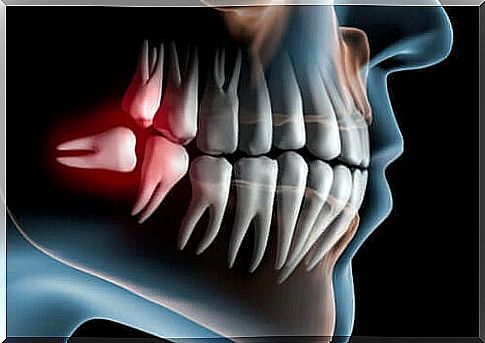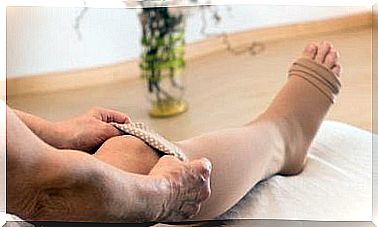Symptoms Of Ingrown Wisdom Teeth And Treatment

The third molars, often known as wisdom teeth, are the last to grow in the back of the mouth. But what happens when a dentist diagnoses them as “wedged”?
In general, the third molar erupts in the posterior sector in the period at the end of adolescence through early adulthood – between 17 and 25 years. However, there are times when the molar does not get through the gums and can not get out. Thus, it is completely or partially trapped underneath, and we refer to it as an ingrained wisdom tooth.
Today’s article will describe how this condition can occur and also its symptoms and complications. You will also read about how dentists treat this problem.
Characteristics of ingrown wisdom teeth
As we mentioned above, the wisdom teeth are the last to erupt at the back of the arch of the mouth. There are a total of four grinders: two upper and two lower on both sides.
The problem is that there is often no room for them to appear, so they get stuck and result in a wedged wisdom tooth.
Furthermore, there are no obvious signs that it comes out in some cases. In others, only part of the tooth may erupt, but part of the crown remains under the gums while some of it is exposed in the oral cavity.
Symptoms of ingrown wisdom teeth
Some of these are asymptomatic, and patients will only find out about them after a dentist’s diagnosis. However, the following symptoms manifest themselves in other cases:
- There may be pain in the area where the molar is stuck or discomfort in the ears and jaw.
- Swelling of the jaw, an enlargement of the area where the molar is wedged – this is common when there is an infection.
- Food remains between the tooth and the gums that cover it when the molars are partially wedged (part of the tooth comes out while the rest remains under the gums). This makes dental hygiene difficult and bacteria and food accumulate under the gums. It often causes inflammation, pain and bad breath.
- The gums become swollen, red and bleed.
- There is bad breath and bad taste.
- Finally, it is difficult to open your mouth.
Consult a dentist if you have any of these symptoms, as they may be due to wisdom teeth that are wedged.

Causes of ingrown wisdom teeth
The main cause of ingrown wisdom teeth is lack of space for their normal eruption. The grinder remains inside the bone because there is no room for it to break out.
Retention can be total, and the tooth remains inside the bone and does not pass through the gums at all. Partial storage occurs when some of it remains inside the bone.
Another cause of this change may be the wrong angle of the tooth inside the bone, which prevents eruptions. This is because the molar will encounter other anatomical structures that do not allow it to break out in the mouth by growing at the wrong angle.
For example, if the grinder is aligned horizontally or obliquely, the growth will run into the other grinder that is in front, or against the back wall, of the mouth. The third molars can be inwards or towards the cheeks or all the way up and down. These abnormal angles make the correct eruption impossible and give rise to the problem.
Some factors increase the risk of wisdom teeth being affected. To be between 17 and 25 years old and have a small lower jaw, for example.
Diagnosis of wedged wisdom teeth
The diagnosis of a wedged third molar is made through a dentist after a clinical examination that may include X-rays. They also take into account the reported symptoms and manifestations they observe while exploring the oral cavity.
X-rays confirm the presence of the tooth that is retained in the bone. In addition, they reveal any lesions in the teeth and surrounding bone tissue.
Treatment
This largely depends on whether there are symptoms or not, and these affect a person’s quality of life.
Asymptomatic teeth
There are times when this condition does not cause inconvenience, but they can choose between two alternative approaches:
- Expectant management. Dentists with a conservative approach recommend checking affected teeth and leaving them in the oral cavity. Their reason is a tooth that does not cause problems, does not require surgery. Extraction is always possible if future problems arise.
- Preventive extraction. Some professionals recommend extraction of wedged teeth to prevent potential problems. They do this to avoid future complications.
However, there is not enough evidence or research to support any of the views.
Painful teeth
The dentist will extract the affected molar if it causes bothersome symptoms. This type of surgery is an outpatient procedure performed by the dentist and lasts between 30 and 60 minutes.
The oral surgeon, after anesthetizing the tooth and / or anesthetizing the patient, cuts the gums and removes the bone that covers the molar during the procedure. Then they remove the tooth, whole, if possible, or in fragments, as needed. They then sew the wound and cover it with gauze.
Those skilled in the art will indicate all necessary postoperative measures to promote healing, such as rest, cold compresses, anti-inflammatory drugs or antibiotics, and a soft diet to recover properly and prevent complications.
The patient should return to the dentist so that they can remove the stitches and check the wound one week after the operation. Minor bleeding, pain, bruising and swelling in the area and difficulty opening the mouth are common manifestations of wisdom teeth.
Furthermore, alveolitis, infections, damage to neighboring teeth, jawbones, nearby nerves, sinuses or temporomandibular joints are less frequently associated complications and require immediate attention.
In addition, you should contact your doctor as soon as possible if there is severe pain that does not go away or numbness or paralysis of the tongue or difficulty breathing.

Get proper care after pulling your wisdom teeth
Complications of ingrown wisdom teeth
Wedged wisdom teeth make oral hygiene difficult as food remains are trapped and bacteria begin to spread in the area. Overall, they can cause some of the following issues:
- Difficulty keeping the back of the mouth properly disinfected. This favors the accumulation of bacteria and food debris. This is a predisposing factor for the development of cavities in these teeth.
- The bacteria that accumulate between the tooth and the gums can lead to infections and abscesses.
- The pressure from the affected tooth can also cause congestion for the other teeth. Thus, orthodontic treatment, in addition to extraction of wisdom teeth, will be necessary to solve this problem.
- Damage to other tooth elements when the affected wisdom tooth generates pressure on the other molar. This is because it can affect the tissue and cause inflammation, resorption or mobility of this neighboring tooth. It also leads to infection in the area and can compromise nearby teeth.
- The molars that are still inside the bone are surrounded by a sac, and the presence of this structure can lead to fluid accumulation and form a cyst which in turn can damage the jawbone, teeth and nerves. In addition, it can develop into a tumor. Extirpation is necessary and requires removal of part of the bone.
- Accumulation of bacterial plaque in the area due to the difficulty of brushing promotes inflammation of the gingival tissue.
Some dentists recommend the extraction of affected wisdom teeth, although they do not cause symptoms due to the possibility of said complications.
Early dental visits are crucial
There is no way to prevent an ingrained wisdom tooth. However, if you visit the dentist every six months, you can monitor the growth and appearance of these molars. Overall , regular dental appointments provide monitoring and early detection of any oral problems you may have.
A wedge grinder can change a person’s quality of life, but they can also go unnoticed. Some cases need no treatment, but others require surgery to resolve any problems they cause or to prevent them.
The recommendation is to take action as soon as possible when you need extraction of affected wisdom teeth. Surgery is usually less difficult in young patients as the roots are not yet fully developed. However, the long, curved roots and the compact stiff leg can complicate the pulling in adults.









